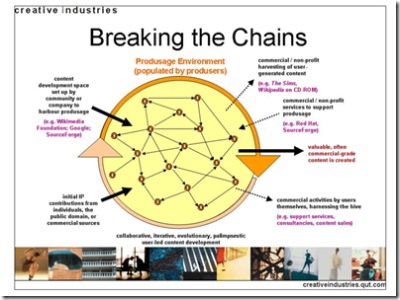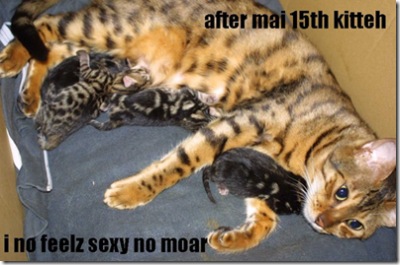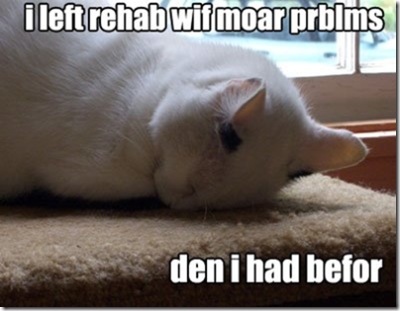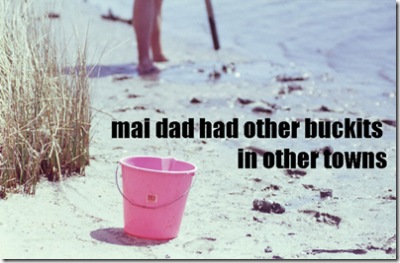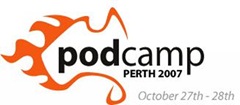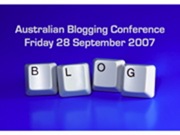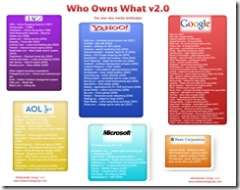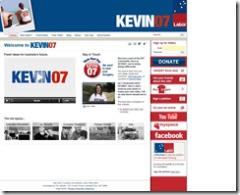Home » web2.0 (Page 15)
Category Archives: web2.0
perthDAC – The 2007 DAC – Wrap-up Post
The DAC (Digital Arts and Culture) conference was in Perth last week and I was lucky enough to be able to attend perthDAC in all its glory. It was the first time DAC has been held in Perth, and only the second time it’s been in Australia; and at the outset, a huge congratulations must go to conference organiser Andrew Hutchinson who ran a very well-oiled event and brought some an amazing intellectual and social extravaganza to our little city. There were so many engaging and exciting ideas and papers floating around that I’ll never do justice to them in one post, but I thought I’d mention a few things and papers that really stood out for me. That said, if you’re after a robust blogging of perthDAC, check out Axel Bruns’ posts which capture the vast majority of the conference. (I’m starting to think Axel should be up for some sort of prize; he’s without a doubt the world’s most thorough conference blogger, conscientiously acting as a collective scribe whose records prove extremely valuable for giving overviews of conferences and keeping in focus some of those details which when not recorded in the instant tend to get lost in the ebb and flow of conferencedom.)
[X] Christy Dena, “The Future of Digital Media is all in Your Head: An Argument for the Age of Integration” – While perhaps less an argument than a snapshot of the present and the trends being laid bare for the future of media, Christy’s paper illustrated the incredibly rich media world we’re all currently living in. More to the point, in looking at Cross-Media, Transmedia and many other points where media is literally crossing medium boundaries (as the plurality of the term has always implied), Christy ended with the salient point that, in assessing the future of digital media, one core point is that it certainly won’t be just digital! Indeed, the future of all media really stands at points of intersection and potential integration of all media in various complex ways. (This point, incidentally, was powerfully reinforced by Stewart Woods whose paper – “Last Man Standing: Elimination and Risk in Social Game Play” – argued that games studies really still needs to keep looking at the social complexities of physical and board-game play which really haven’t been fully explored in the algorithmically bound play of digital videogames.)
[X] Mark McGuire, “Virtual Communities and Podcasting: the emergence and transformation of public electronic space” – Mark used the work of Jurgen Habermas on the public sphere and combined it with a solid overview of internet communities (like the WELL) and community-practices (such as those encouraged and facilitated by Amazon.com) to interrogate the relatively new history of podcasting. The shift from the utopian ideals of Dave Winer (and to a lesser extend Adam Curry) to the commercialisation of podcasting – in terms of accessibility and distribution, if not creation – is seen as another instance where community-led ideals and interaction are undermined by a lack of public ownership and public institutions (exemplified by Apple’s commercial iTunes Store becoming the default podcasting directory, and thus major podcasting portal).
[X] Axel Bruns, “The Future is User-Led: The Path towards Widespread Produsage” – Axel has been sharing his work on ‘produsers’ (producer/users) for some time now, but each time I hear or read his work, I’m impressed by how carefully situated it is. While produsers are clearly part of the same realm as participatory culture and citizen journalism, Axel takes great care in showing that a change in the modes of production and consumption in the era of networked communication and distribution (the core of the produser) has great social and democratic potential, but is sure to acknowledge that produsage still needs political drivers in order to avoid being co-opted (Amazon.com is a great example of produsage, but the social networks and user-generated content on their website is clearly working in financial terms primarily for Amazon). One slide Axel showed which I thought summarised his take well was a fairly complex dynamic which showed culture in the double sense of both our world and of a scientific Petri Dish in which something is refined and grown before it becomes fully realised and useful for the real world:
You can read Axel’s full paper and get the full set of PowerPoint slides over at his blog; I can’t wait for the book! (On another note, I didn’t manage to convince Axel of Twitter’s value – not for lack of trying – but we did chat about the Mashedlc project which I’m very interested in and think it could be of very real value for educators using web2.0 tools in their teaching.)
[X] Jill Walker Rettberg, “Blogs, Literacies and the Collapse of Public and Private” – In a nutshell, Jill argued that while traditional (print) literacies was part of the reification of a divide between public and private, newer digital (network) literacies are leading to the blurring, or even collapse, of that neat binary division. Of course, many cultural commentators and others have vested interests in the public/private divide, and the blogging ethos or every reader potentially being a writer has produced something of a backlash (albeit as much due to skepticism of the shift rather than a deeper engagement with it). Jill and Axel’s papers had a lovely symmetry, both arguing for new ways of conceptualising fair traditional things on the back of the shifts toward a more meaningful participatory culture. Jill’s paper is also part of an upcoming work, her Blogging book due from Polity Press next year. I think that, too, is well worth watching for.
While I shan’t go into any depth, DAC also had quite a few papers on games (both digital and otherwise) which I really enjoyed and, for a game studies novice like myself, game a very accessible overview to current trends. The two stand-out papers for me were Torill Mortensen’s, which looked to synthesize the current multiple directions of games research into a menaingful single framework, and a paper by Nick Montfort and Ian Bogost (delivered by Fox Harrell) which looked at the idea of Platform Studies which explores the way actual game platforms influenced the design, agenda and possibility for game play and game design. Another exciting area were papers from Lisbeth Klastrup and Larrisa Hjorth (the later of which was presented by Christy Dena) both looked in depth at mobile phone culture in relation to community-building and story-telling respectively (although obviously with large points of intersection).
Outside of the formal academic papers, two things about DAC really stood out: it’s as much a community as a conference, and it’s heavily invested in maintain connections with art and pratice beyond the formally academic. Case in point: this year’s DAC was perfectly integrated with the larger BEAP and as part of DAC we visited I took a deep breath…, Impermanence (PDF), Still, Living (PDF) and other exhibitions, complete with artist and curator talks. This, mixed with DAC’s informal performance night, meant that broader discussions art, digital media and interaction, were focused through shared experiences and provocative installations. On the social side, DAC folk combine intellectually exciting and socially engaging in impressive proportions! In that spirit, I took a few photos which are in a perthDAC Flickr set and Lisbeth Klastrup has posted a DAC 2007 photo set, too. Of course, the thing that everyone really wants to know is who’s the best DAC dancer, and, somewhat surprisingly, thanks for Scott Rettberg (part of the GTA team), we now know:
Fox Harrell is an excellent dancer, and Mary Flanagan does some amazing hyperkinetic lawnmower-and-grocery-shopping-moves. Lisbeth Klastrup was clearly the most agile of the Scandinavians, though Jaakko was nearly as fluid and he won the prize for the coolest T-Shirt — the “conference moderator” shirt with the built-in-clock. I was shuffling at about an equivalent level to Raine Koskimaa, average Finnish dancer.
Follow Scott’s post back for a cameraphone video capturing the DAC dance action (and, no, I’m not there on the dance floor you’ll be relived to hear).
Finally, here’s a picture of Mary Flanagan from Lisbeth’s set, reminding us all to be there for DAC 2009 …
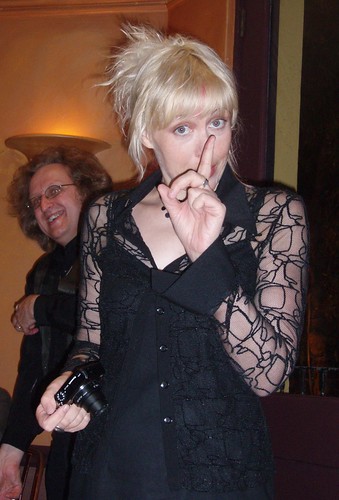
Post LOLCats Secrets
What happens when the immovable confessional heartland PostSecret meets with the unstoppable force of the LOLCats meme? LOLSecretz! ‘Tis sad and funny at the same time. My favourite three thus far:
Head to LOLSecretz for a whole lot more …
[Via]
Podcamp Australia: Perth, October 27 & 28
The dates and venue for Podcamp Australia are now locked in, so make sure you keep 27 & 28 October free in your schedule!
I’m part of the Perth end of the organizing committee, but I’ve been traveling a lot of late and have been shamefully hands-off thus far, so kudos have to go to Richard Giles for lining up the venue and Les Quarman from Central TAFE (the East Perth section) for agreeing to allow Podcamp Australia in their unconference-friendly facilities!
So, Australians, especially those who can make it to Perth for 27 & 28 October, who and what do you want at Podcamp? And what are you will to do at Podcamp?!?
Learning Futures: Day Two Insights
Insight #3: If ePortfolios and other forms of electronic presence are going to be (or are) a core part of the way graduates ‘sell’ themselves to employers, then identity management needs to be taught at all levels of education. Identity management includes those aspects of identity which we intend employers to see, and those we don’t want seen. If a basic search online for someone’s full name reveals drunken party pictures on Flickr or YouTube clips of bullying antics in their youth, then that is just as likely to be viewed by employers as the intended ePortfolios or other material. Identity management clearly is something of a challenge, especially as many educators aren’t fully aware of how much students can put online (or how to temper that), but the Internet never forgets and we need students to be able to understand that for all sorts of reasons, and future employability is clearly one of them.
Insight #4:The unconference model only works when all the participants have a strong sense of what they are intending to pull apart or critique in advance. If half of a conference is populated by people trying to get a basic understanding of something – in this case Web 2.0 – then the unconference model of primarily relying on informed participants leading all the conference sessions themselves, directed by their conversations and thinking, to the exclusion of traditional papers or presentations, is doomed to disappoint a lot of people attending that form of conference. (This, incidentally, is not a personal gripe, but a clearly articulated sense from a number of my fellow conference delegates).
Learning Futures: Day One Insights
I’m at the Learning Futures Symposium today and tomorrow. I’m not blogging summaries of sessions because, to be fair, that’s often quite dull. However, I thought I’d take the opportunity to take the conference discussions to springboard some observations or thoughts that occurred during these interactions…
Insight #1: There is a reasonable amount of critical distance in terms of the ‘digital natives/digital immigrants’ rhetoric, but the same critical perspective doesn’t stretch to critiquing the idea of ‘web 2.0’. Whereas ideas which supposedly encompass an entire generation are easy enough to pull apart, many educators seem wary of software and claims made about software as they acutely feel that this is one of the few areas in which students know more about this area than they do. I suspect that if the same educators were dipping their toes in a little more they’d realise something commonsensical which seems to have entirely escaped these kind of conversations: that while there are many types of web 2.0 software, there are generic skills to be found in using these tools and platforms. The reason that people can move from Friendster to MySpace to Facebook so easily, for example, is that at a basic level there is a lot of similarity between the way these platforms operate and the skills needed to use them. Sure, the rate of new names of software can be overwhelming, but if we remember that a large section of the skills learnt using one social software platform are viable for the next, super-duper, upcoming must-have web 2.0 tool are transferable, that makes taking the time to learn and teach them a whole lot more important and palatable. And social software platforms are just one example; skills in blogging, using wikis and many other forms of ‘web 2.0’ tools are similarly transferable and, at some level, generic. Perhaps we should be focusing more on what those skills are.
Insight #2: Often the people in the driving position for educational policy aren’t confident to make decisions about ICT – nor should they be!
It’s Going to be a BIG September!
I’m attending four conferences or symposia across the next four weeks. In a perfect world, each will come with details blogging; however, if I don’t get around to writing much for a few weeks, here’s why …
[X] Learning Futures Symposium – 10 & 11 September, Canberra – This is a two-day symposium held at ANU looking at the changing shape of education, pedagogy and learning in general in the face of changes brought on by digital communication under the web2.0 umbrella. The programme (pdf) looks pretty interesting, with showcases of Australian social software educational efforts and some great sessions which are more centred around conversations than too many formal presentations.
[X] Thinking Society, Thinking Culture – 13 & 14 September, Perth – This is an interdisciplinary forum organised by the Institute for Advanced Studies at UWA with the aim of bringing WA’s many academics, researchers, artists across the range of historical and cultural studies, and other social sciences, together the share their work and build fruitful interdisciplinary networks and exchanges. I’m giving my paper “‘We’re sorry, but the clip you selected isn’t available from your location’: Watching Battlestar Galactica in Australia and the Tyranny of Digital Distance” in ‘A Digital World’ session which takes place on Friday, 14 September starting at 10.30; this panel will also feature Toby Burrows talking about ‘e-Research and the Humanities: Current Directions’, Ethan Blue talking about ‘Prison Medical Photography in Early 20th-Century California’ and Jeremy Blank speaking on ‘Past,Present,Futures:Integrating practice in Visual Art studies’.
The keynote is being delivered on Thursday (13th) evening by Ross Gibson from UTS talking on “The Aesthetics of Repletion“; this talk is open to the public, so if you’re in Perth, come along!
[X] PerthDAC – Digital Arts & Culture – 15 to 18 September, Also Perth – DAC has a history of being at the cutting edge of digital arts and media studies and this year looks to be no exception. There’s lots to look forward to, from talks on blogs in education to Axel Bruns on produsage to a host of key names in game studies talking about everything from Second Life to the Wii. DAC is concurrent with BEAP (the Biennale of Electronic Arts Perth) so the theory of DAC will mix with the performance and exhibitions of the latest in digital art which will no doubt be a very rich and exciting four days!
[X] The Australian Blogging Conference – 28 September, Brisbane (Free!)- Sessions will include The Politics of Blogging; Researching Blogging; Blogs, Creativity and Creative Commons; Legal Issues; Citizen Journalism, Blogs and Education; Business and Corporate Blogging; and Building a Better Blog. I’ll be facilitating part of the Blogs and Education session, although I’m not sure how many people will be there since I suspect the concurrent Citizen Journalism session, which includes a focus on YouDecide2007, might prove quite a draw-card. That said, Blogging in Education is certainly fun to talk about and there’s a lot going on in the world of edublogging, so I trust we’ll have some great exchanges in our session, too! To see who’s already confirmed they’re attending, click here; that list will grow substantially across the next few weeks, I suspect!
I’m also chuffed it’s September because that means Jill Walker Rettberg will be joining us at UWA for the month! And let’s not forget that October will also include Australia’s first Podcamp which will also be held in Perth!
Australian Blogging Conference: 28 September 2007
The big news of the day is that The Australian Blogging Conference, a fabulous-looking free one-day event exploring everything about blogging in Australia (including education and Creative Commons!) now has a date: Friday, 28 September 2007 in sunny Brisbane! All of the details are here. I’d write more, but I’m now running around to see if I can get myself from Perth to Brisbane for the day of the conference!
Update: I’ve successfully organised flights and my benevolent university has agreed to part with me for the day (yes, the day, so I’ll be on red-eye flight at midnight Thursday flight!) so Aussie BloggerCon here I come! 🙂
Who Owns Web2.0?
The answer to ‘who owns web2.0?’ should probably be ‘everyone who uses it’, but a recent post by Amy Webb uses a very simple but important image to remind us all that convergence isn’t just a technical or cultural term, it’s an industrial gameplan for everyone from Google and Yahoo to Rupert Murdoch’s NewsCorp:
[Via Steve Rubel & Amy Gahran]
Facebook Off!
Facebook Off … when college social networking turns bad!
(Or: The Perils of Identity Theft for Beginners) [Via Sivacracy]
Kevin 07! (Or: Team Rudd gets its Web2.0 on!)

So, Kevin07 is here! Australian Labor leader Kevin Rudd has gotten all web2.0 and has a new portal website which integrates nicely with Labor and Rudd’s re-vamped MySpace page, YouTube and Facebook. As I’ve discussed in the past month, Labor has already shown far more success in using MySpace and Facebook than the Liberal party. Liberal leader and current PM John Howard has tried to use YouTube, but each video clip led to the deleting of comments and each video also seems to have less and less viewers.
Kevin07 was launched today, so for historical archival purposes, here is a full screenshot from day one:
The layout is fairly straight-forward and is clearly based on a the design of both the Hillary08 (screenshot) and Obama08 (screenshot) campaigns for the 2008 US Presidential election. There is a little danger in Australia in pushing the individual (Kevin) over the party (Labor) since Australians are still less comfortable with celebrity politics (hence, among other things, no Australia President) but I’ve got to say I think the Labor media advisors have done a very decent job on this portal. In an article in PerthNow, Rudd’s team certainly seem to be making the right noises about how social software would work during the election campaign:
“Kevin07 will encourage supporters to interact with one another, participate in blogs and stay in touch with what is happening on the campaign trail,” Labor’s campaign director Tim Gartrell said.
On the negative side, ABC News has a story about some very strongly worded responses from Liberal Party faithful:
But Assistant Treasurer Peter Dutton says voters will eventually see the light, and has labelled Mr Rudd’s approach as a “load of crap”.
“People at the moment are looking at Kevin Rudd like they’re looking at a promo for Big Brother,” he said.
“I mean it’s exciting, it’s fresh and when the big night comes, and people actually have a closer look and they look at the detail and they get a better understanding about what the show is about, they actually realise that the show is a load of crap.”
“The thing I say to Australians is please, don’t just look at the media tart, look at the policy detail.”
However, what Peter Dutton fails to understand, is that a generation who started watching Big Brother when they were 13 are old enough to vote this year. More to the point, dismissing the web, which is a central social space for those in the late teens and twenties, is clearly alienating the majority of a key demographic group. On more stable ground, The Age has tried to take Team Rudd to task for not registering all the possible Kevin07 variant domains (.net, .org etc) but if that’s the only issues the mainstream media can find, then I’d have to say Kevin07 is a winner in terms of design and its connectivity with voters.

